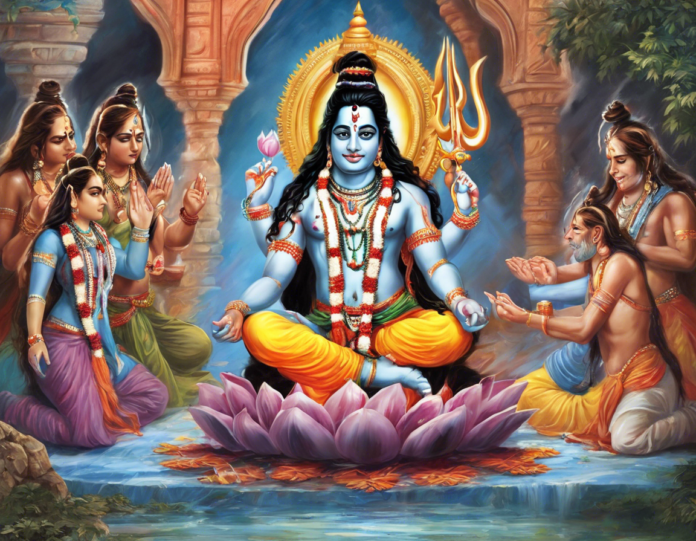MAHA SHIVARATRI 2024: A CELEBRATION OF LORD SHIVA
Maha Shivaratri is a significant Hindu festival celebrated annually in honor of Lord Shiva. This auspicious occasion holds great importance for devotees who partake in various rituals to express their reverence and devotion. The date of Maha Shivaratri is determined by the Hindu lunar calendar and falls on the 14th night of the dark fortnight in the month of Phalguna. In 2024, Maha Shivaratri is set to be observed on February 21st.
The Significance of Maha Shivaratri:
Maha Shivaratri holds immense spiritual significance for Hindus as it is believed to be the night when Lord Shiva performs the cosmic dance of creation, preservation, and destruction – the Tandava. Devotees believe that observing fasts, meditating, and chanting prayers on this day can help them attain spiritual liberation and seek the blessings of Lord Shiva.
Rituals and Celebrations:
1. Fasting: Many devotees observe a fast on Maha Shivaratri as a mark of devotion. Some may abstain from food and even water for the entire day, while others opt for a partial fast by consuming fruits and milk.
2. Night-long Vigil: Devotees often stay awake throughout the night, engaging in prayers, meditation, and hymn recitations. This night-long vigil is believed to please Lord Shiva and bring prosperity and blessings.
3. Abhishekam: Special prayers and rituals, including the ceremonial bathing of Shiva Linga with milk, honey, yogurt, ghee, and water (known as Abhishekam), are performed in temples dedicated to Lord Shiva.
4. Visiting Temples: Pilgrims visit Shiva temples to offer prayers, flowers, and bilva leaves to seek the Lord's blessings and protection.
5. Chanting Mantras: Devotees chant powerful mantras such as the Maha Mrityunjaya Mantra and Om Namah Shivaya to invoke the divine energy of Lord Shiva.
FAQs:
1. What is the significance of fasting on Maha Shivaratri?
Fasting on Maha Shivaratri is believed to cleanse the body and soul, purify the mind, and help devotees focus on spiritual pursuits. It is a form of penance and dedication to Lord Shiva.
2. Can anyone observe Maha Shivaratri fast, or are there restrictions?
While anyone can observe the fast, pregnant women, individuals with health conditions, and elderly people are advised to consult a healthcare provider before participating in rigorous fasting.
3. Why is the night vigil on Maha Shivaratri important?
The night vigil, known as Jagran, is considered significant as it symbolizes staying awake to ward off ignorance and darkness. It is believed that prayers offered during this time are especially potent.
4. What is the significance of offering Bilva leaves to Lord Shiva?
Bilva leaves are considered sacred to Lord Shiva, and offering them is believed to please the deity and bring blessings. The trifoliate shape of the leaves symbolizes the three aspects of existence – creation, preservation, and destruction.
5. Are there any specific mantras to chant on Maha Shivaratri?
Chanting mantras like the Maha Mrityunjaya Mantra ("ॐ त्रियम्बकं यजामहे सुगन्धिं पुष्टिवर्धनम्| उर्वारुकमिव बन्धनान् मृत्योर्मुक्षीय मामृतात्") and Om Namah Shivaya ("ॐ नमः शिवाय") are considered auspicious on Maha Shivaratri.
6. Can non-Hindus participate in Maha Shivaratri celebrations?
Maha Shivaratri is a Hindu festival, but its essence of devotion, spirituality, and self-discipline is universal. Non-Hindus who respect the traditions and wish to participate with sincerity and reverence are often welcome to join in the celebrations.
7. How is Maha Shivaratri celebrated in different parts of India?
While fasting, visiting temples, and performing rituals are common across India, different regions may have unique customs. For example, in Orissa, people create miniature Shiva Lingas using mud, while in Maharashtra, offering bael (bilva) leaves is customary.
8. What should one wear while visiting a Shiva temple on Maha Shivaratri?
Devotees often choose traditional attire such as dhoti-kurta or saree for temple visits on Maha Shivaratri. Wearing clean, modest clothing is typically advised as a sign of respect for the sacred occasion.
9. Can Maha Shivaratri be observed at home, or is it necessary to visit a temple?
Maha Shivaratri can be observed both at home and in temples. Many devotees choose to perform rituals, offer prayers, and observe fasts in their homes, while others prefer to seek the divine presence of Lord Shiva in temples.
10. What is the best time to perform Abhishekam on Maha Shivaratri?
The most auspicious time for performing Abhishekam on Maha Shivaratri is during the night, particularly during the period known as the "Mahashivaratri Parana" when devotees pay their respects to Lord Shiva.
Maha Shivaratri is not just a festival; it is a spiritual journey that allows devotees to connect with the divine energy of Lord Shiva. Through rituals, fasting, prayers, and meditation, followers seek blessings, strength, and inner transformation on this sacred day. As the world comes together to celebrate the auspicious Maha Shivaratri in 2024, may Lord Shiva's grace illuminate our lives with peace, wisdom, and eternal bliss.

